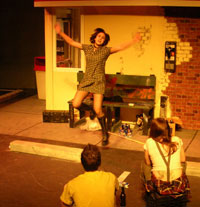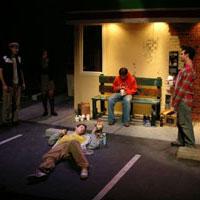For a sleepy Tuesday in March, McCormack Theater was more packed than would be anticipated. Students and faculty alike sat in excited groups eagerly awaiting the UMB Theaters last performance of Eric Bogosian’s, Suburbia. They were not to be disappointed; there would be no sleep on Tuesday for any of us. Though Suburbia is a scathing analysis of twenty-something angst and the warped American dream, it could not stand alone were it not for the stellar performances and stage direction of the UMB Theater company. At once humorous, charismatic, disturbing, and candid, the UMB players brought Suburbia home with startling resonance. Suburbia takes place in the mid-nineties when flannel was huge and everybody thought Kurt Cobain was the second coming. The play opens with main characters Jeff (Paul Norton), Buff (Aaron Ranf), and Tim (Marc Dante Mancini) doing what they do – primarily, getting tanked in the parking lot of 7-11. Jeff, the protagonist, plays the ambiguous every-man with a penchant for spouting socially conscious drivel that he learned from his one class at Community College. However, Jeff has neither the drive nor the clarity to act on his humanistic concerns. In stark contrast, Tim is a nihilistic Air Force vet, who, despite the fact that he’s been all over the world, is content to shout racial slurs at the convenience store owner, Nazeer, while pounding Pabst Blue Ribbon. Though superficially one is driven to sympathize with Jeff throughout the course of the play the viewer learns that for all his social consciousness, his inaction makes him no more admirable than the venomous Tim. Meanwhile, their rage against the machine is parodied by their burn out friend Buff. Buff spends the duration of the play drinking and smoking himself into a happy stupor, yet he proves to have more mobility than either Jeff or Tim. Aaron Ranf’s performance as Buff kept the entire audience laughing even when he did not have a line. Likewise, Mancini’s Tim was a genuine illumination of a confused would be intellectual. His monologue during the second half when he realizes his “freedom” and commences to take off his clothes was one of the plays high points (there are many, don’t get me wrong!). Paul Norton, also did a fantastic job at playing Jeff. He was truly hateful, yet the nuance in his performance hinted at a tortured soul, and one cannot help but be fascinated by him. The wrench is thrown in when Sooze (played by a saucy Piper Galen), Jeff’s aspiring feminist performance artist/girlfriend, states that Pony (Eric Barriere) will be joining them for yet another evening of drunken frenzy. All would be well and good if Pony had not actually done something for himself and become a fledgling rock star. To Sooze, whose dream is to soon leave for New York, Pony’s arrival is a refreshing break from the rut of drinking in a parking lot with her ambivalent boyfriend. Strike that, more than a refreshing change – Pony’s arrival is her escape. Jeff’s bitter jealousy drives him to drink all the more and he can do nothing to stop the downward spiral of the evening. To satirize Sooze and Jeff’s romance, Buff has a brief liason with Bee-Bee (Magdalen Blankenship), wherein all that exists between them is a quickie that is just as soon forgotten about as it was commenced in the woods behind the 7-11. Galen’s Sooze is as tempestuous as the character is meant to be. Her “performance art” is ill-advised for anyone with a heart condition. Blankenship carries Bee-bee with so much tension that she doesn’t even need to speak to get her point across. Barrier’s portrayal of Pony is very natural, at times providing some genuine laughs. Especially when he sings. From the start, tempers are strained to acuity, the tension culminates when Pony’s press agent, Erica (Katherine McFarland) arrives on the scene. Her desire to go slumming takes her from Tim to Jeff prospectively. No matter how hard Pony tries to be the same guy he always was, he only accents how much he’s changed. His romanticizing of life in the suburbs, makes it seem all the more bleak for those he left behind. The play climaxes with some high tension gun slinging spurned by racial hate, a fake out murder, and a tragic death– but I don’t want to give it away. What is learned is that some may hide behind stereotypes to mask their own fear of human intimacy. Others may stay in a rut because they are afraid of making the wrong move. Still others will continue to numb themselves so they don’t have to feel. And some are just plain lucky for no good reason. Suburbia begs the viewer to try to make some sense of it all, to find out if life is really as pointless as some lead themselves to believe. The performance’s strengths lie in its ensemble cast whose understanding of one another illuminates the frustration, and the flickerings of hope present in the limbic state of Suburbia. Great job, UMB Theater.
Suburbia
Vanessa Cano
April 3, 2006






















































